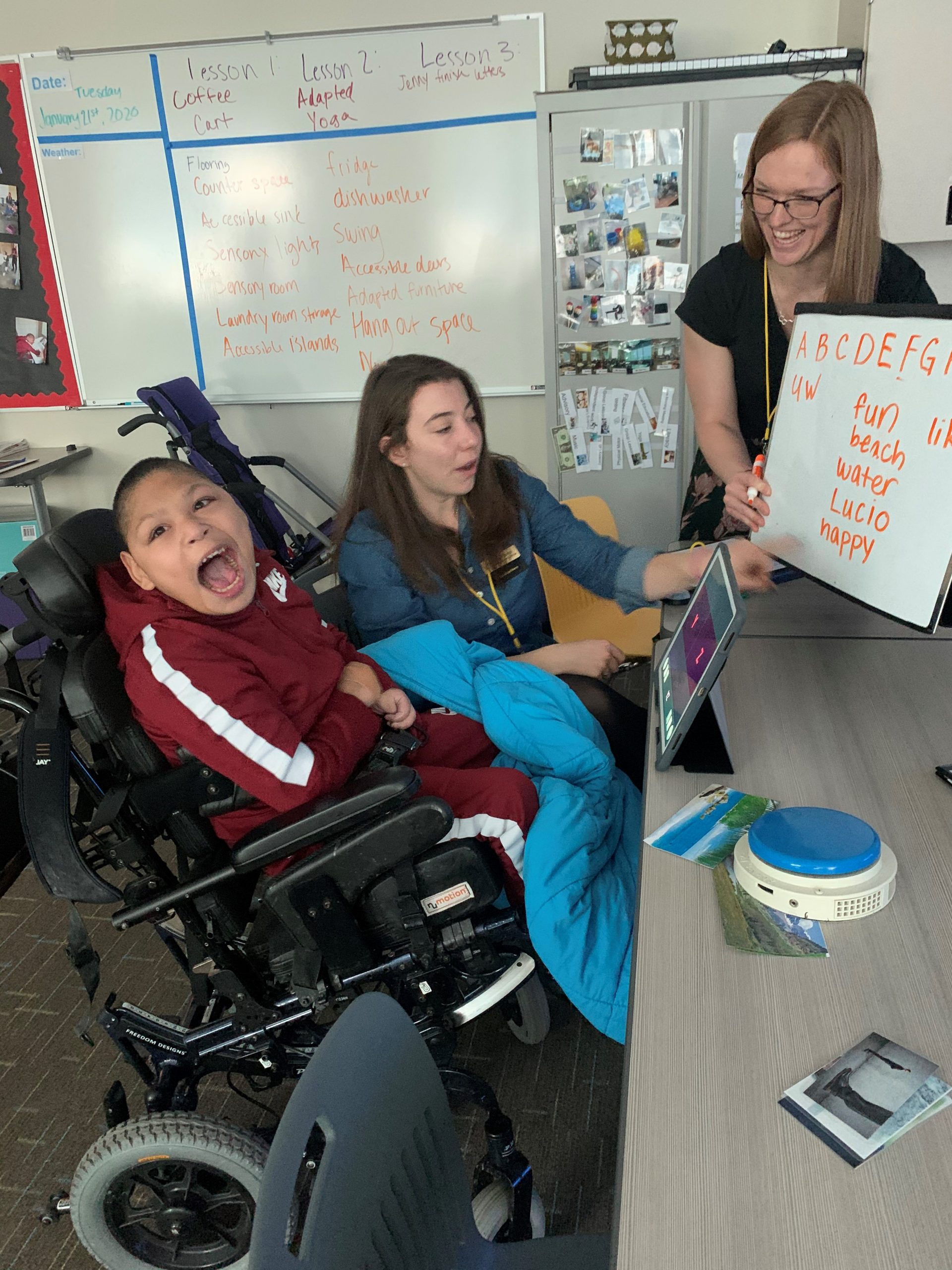
Program Contact
Sherri Tennant
sherri.tennant@colorado.edu
303.492.3038
Individuals with complex communications needs are unable to use speech to meet daily communication needs due to various medical conditions, including autism, cerebral palsy and Angelman syndrome. For individuals with these needs, augmentative-alternative communication (AAC) systems offer essential means of expression. These systems include various low- and high-tech methods of communication that can help those who are unable to speak (e.g., picture-based communication books, iPad apps and speech generating devices). The AAC systems are customized to meet each individual’s needs.
Throughout this multi-year project, CU Boulder faculty and graduate students from the Speech, Language and Hearing Clinic in the Department of Speech, Language, and Hearing Sciences provided training for speech-language pathologists, administrators, educators, paraprofessionals and other staff at the Denver School of Science and Technology (DSST). More than half of school-based speech language pathologists work with students who use or could benefit from AAC systems, but many of them have not received training to serve these students. The training provided by CU Boulder helped DSST professionals more effectively support middle and high school students with complex communication needs (CCN) by helping them complete augmentative-alternative communication (AAC) assessments and implement AAC intervention strategies.
The project has also had yielded benefits for CU Boulder students by providing hands-on experience with AAC assessments and follow-up interventions. In addition, the project helped secure Medicaid approval and funding for DSST students’ AAC systems as well as training for family members to communicate with them using these newly acquired systems. The last phase of this project is the development of multi-media training modules, which is currently underway. At the completion of this phase, five modules will be made available online to professionals who work with adolescents who would benefit from AAC systems and intervention.
Campus training for speech-language pathology students
Additional Info
From August 2019 until July 2024, 34 graduate students in the MASLP program in the Department of Speech, Language and Hearing (SLHS) were and continue to be trained through this outreach grant project. Some of the teaching and preparation has been provided on the CU-Boulder campus but most of the training was completed in DSST middle and high school classrooms.
Location
on campus
Dates
8/26/2019 - 7/26/2024
Public or Private
Private Program (by request only or for a specific audience or group)
Program Fee
No charge to attend/participate in activity or program
Family Trainings at DSST Schools
Additional Info
In spring and summer 2021, summer 2022, and fall 2023, family trainings were completed at the DSST schools, Conservatory Green and Montview High Schools.
Location
in colorado
Denver
Dates
5/13/2021 - 7/26/2024
Public or Private
Private Program (by request only or for a specific audience or group)
Program Fee
No charge to attend/participate in activity or program
Presentation at ATIA Conference
Additional Info
On February 4, 2023, Sherri Tennant, Dr. Christine Brennan and five of the graduate students who participated in this outreach grant project presented their process and outcomes at the Assistive Technology Industry Association (ATIA) national conference in Orlando, Florida. This was a 60-minute, in-person presentation.
Location
outside colorado
Dates
2/4/2023 - 2/4/2023
Public or Private
Public Program (open to the public)
Program Fee
Yes
Development of Multi-Media Training Modules
Additional Info
Sherri Tennant has been working in collaboration with Two Tiger Productions and CATIC in Mexico City to develop five multi-media training modules in English and Spanish. Professional videos that convey best practices in AAC assessments and intervention were captured in DSST classrooms and have been incorporated into these modules. The family trainings that were captured on video for these modules were delivered in English and Spanish. The first module on AAC Assessments will be available to the public in spring 2024.
Location
Dates
Ongoing
Sponsoring Units
College of Arts & Sciences
- Department of Speech, Language & Hearing Sciences
Program Partners
- Denver School of Science and Technology (DSST)
- Two Tiger Productions
- Centro de Apoyo Tecnologico para la Comunicacion y el Aprendizaje (CATIC)
Audiences Served
- Adult Learners
- Families
- Historically Excluded/Marginalized/Non-dominant Group(s)
- People Of Color
- People With Disabilities
- Socioeconomically Disadvantaged
- Students - English Language Learners (ELL)/Emergent Bilingual
- Students - High School
- Students - Middle School
- Teachers - Middle School
- Teachers - High School
- Urban Communities